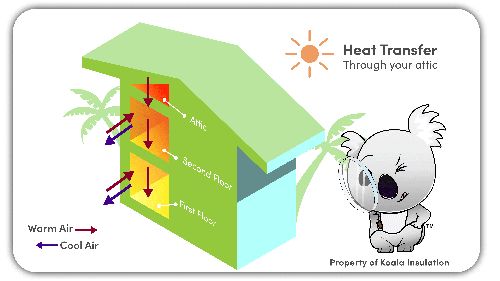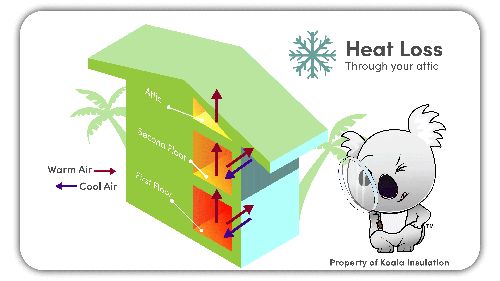Why Is Attic Insulation Important?

Summer time.
As heat rises, attics can reach 140 degrees or more. Sun rays beam down to the roof and, without a properly insulated roof, the temperature will rise in the attic. Without a properly insulated attic, the heat will transfer through the ceilings into other floors of the house. The heat, or energy, transfer that occurs added to the hot air being pushed into the house will have the following outcome: uncomfortable temperature, uneven temperature in rooms, higher workload for your HVAC system, and your energy consumption will be much higher, resulting in an expensive energy bill.
Winter time.
The lower level of your house can be drafty and cold if insulation is not installed properly. Without good insulation and proper sealing, air escapes from the building envelope. This is called the stack effect. In the wintertime when heating your house, the warm air always rises upwards. Without proper insulation, that warm air will escape through the ceilings into the attic. The air that escapes is then replaced by cold air coming in through small gaps and cracks, which is why air sealing is important.

How Do I Check My Attic Insulation?
When checking your attic insulation, prepare with safety in mind. Before going into your attic, make sure to have the following equipment:
- tape measure
- flashlight or headlight
- hard hat or cap for head protection
- safety glasses
- gloves
- face mask
Upon entering the attic, use the flashlight to look for boards to walk on, if needed. Take all necessary precautions to avoid falling through the drywall. Safety Note: Some attics have vermiculite insulation, which may contain asbestos. If you are worried you have this type of insulation in your attic, contact your local heath department to have it tested.
Proceed to measure your insulation levels. If you have existing batt insulation, read the level of R-value printed on the batts. You can also use a measuring tape to measure the depth of the insulation.
To calculate the total R-value of batt insulation, use this formula: number of inches of existing insulation x 3.2 = total R-value
What Is The Best Type Of Insulation For An Attic?
It depends on the type of attic space. For tighter space attics, cellulose is an industry preferred option. For larger spaces, when looking for the most efficient, open-cell spray foam is a better choice. However, the most budget friendly option for most attic spaces is air sealing combined with cellulose insulation. As always, it's important to research the various types of insulation so you understand the differences and their significance.
What Is The Best Way To Insulate An Attic?
Although it may sound appealing to install your own attic insulation, it's highly recommended to hire an insulation professional. Many attics contain hazards that can be difficult to navigate such as: high heat levels, sharp objects such as nails, non-sturdy or hidden floors/ceiling joists. By hiring a professional, they will make sure the HVAC ducts and ceiling are not damaged. Most warranties offered by a manufacturer are not upheld unless the insulation is installed by a professional.
How Much Does It Cost To Insulate An Attic?
The cost depends on the type of insulation you select as well as the square footage. When evaluating your insulation budget, be sure to first refer to "What is the Best Type of Insulation for an Attic?" in order to determine the type of insulation you want first. The prices of each will vary because of their different qualities and capabilities. Call your local insulation company to get a free quote. See if Koala Insulation services your area here.
How Much Of A Difference Does Attic Insulation Make?
Insulation can affect up to 40% of your heating and cooling costs. Attic insulation should be the primary focus when doing an insulation evaluation. Depending on where you live, the changes in the weather cause vastly different outcomes. In northern areas where there are extremely low temperatures, heat transfer outside of the home is most often the more common concern. In southern areas where the temperatures are extremely high, heat transfer into your home can be a higher priority. Discuss with your local insulation contractor to determine what kind of problems are the most concerning for homeowners in your area.
Is Adding Insulation To An Attic Worth It?
Although it may seem like an extra step to ensure the quality of your attic insulation, it's one of the most important areas in your house to check on regularly. Without proper attic insulation installed, you will lose most of the heat or air conditioning in your home. This will result in higher energy consumption, leading to a more costly energy bill. Additionally, you can expect a shorter life expectancy and higher maintenance costs for your HVAC unit, hot and cold spots throughout your building envelope, and decreased comfort levels.
What Is The Best R-Value For Attic Insulation?
The best R-value for attic insulation depends on a few factors. Determining which climate zone you are located in is the first step. Northern climate zones recommend up to an R-60. Southern climate zones recommend up to an R-49. Contact Koala Insulation with any questions or concerns about your climate zone and R-value.
What Do Attic Fans Do?
Attic fans help to remove hot air from the attic and pull in cool air. Insulation and attic fans work like Batman and Robin, they go hand in hand. You can have insulation without an attic fan, but you cannot have an attic fan without insulation. Having attic insulation and an attic fan make a great team by helping the attic ventilate to keep the attic cooler. The most efficient option is a solar attic fan.
We Provide Insulation Services to the Following Denver Central Areas
AURORA, DENVER, FOXFIELD
Counties Served
ARAPAHOE, DENVER, ADAMS
Zip Code
80014, 80202, 80203, 80204, 80205, 80206, 80211, 80218, 80220, 80222, 80224, 80230, 80231, 80246, 80247, 80264, 80265, 80274, 80290, 80294, 80013, 80015, 80016, 80010, 80011, 80012, 80017, 80018, 80045
